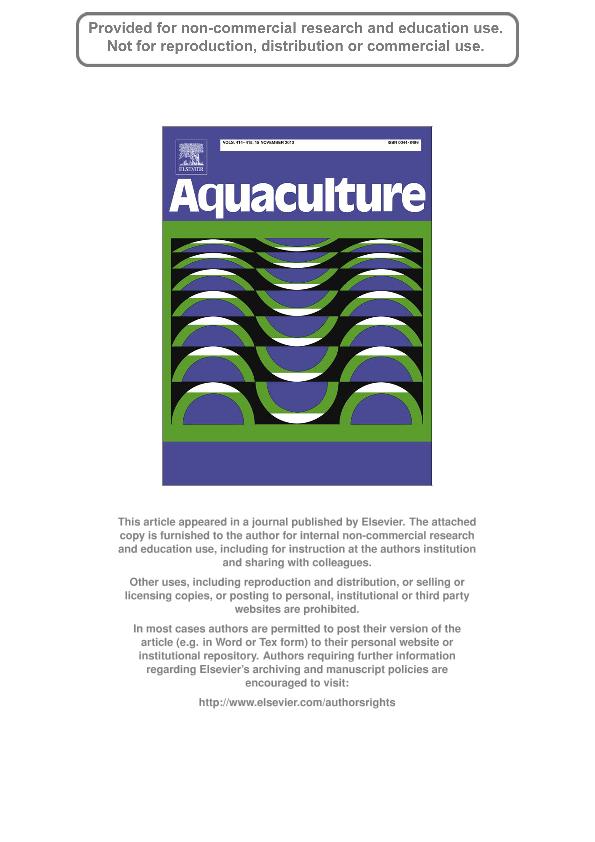Mostrar el registro sencillo del ítem
dc.contributor.author
Hermida, Miguel
dc.contributor.author
Bouza, Carmen
dc.contributor.author
Fernández, Carlos
dc.contributor.author
Sciara, Andres Angel

dc.contributor.author
Rodríguez Ramilo, Silvia T.
dc.contributor.author
Fernández, Jesús
dc.contributor.author
Martinez, Paulino
dc.date.available
2016-03-18T18:18:31Z
dc.date.issued
2013-11
dc.identifier.citation
Hermida, Miguel; Bouza, Carmen; Fernández, Carlos; Sciara, Andres Angel; Rodríguez Ramilo, Silvia T.; et al.; Compilation of mapping resources in turbot (Scophthalmus maximus): A new integrated consensus genetic map; Elsevier; Aquaculture; 414-415; 11-2013; 19-25
dc.identifier.issn
0044-8486
dc.identifier.uri
http://hdl.handle.net/11336/4858
dc.description.abstract
The turbot (Scophthalmus maximus) is a species of great relevance to European aquaculture and hence might benefit from enhanced genomic resources. The aim of this study was to integrate all previous turbot mapping resources to obtain a dense consensus genetic map. A total of 514 single nucleotide polymorphisms (SNP) and microsatellite markers from reported turbot genetic maps, were used for map construction. Among these markers, 487 (LOD score > 3), including 39% expressed sequence tag (EST)-linked and 61% anonymous, were integrated in 24 linkage groups. The linkage map comprised a total length of 1414 cM (1274.4 cM framework) with 3.3 cM (3.6 cM framework) inter-marker distance, representing an estimated genomic coverage of ~ 90%. This map was used to refine quantitative trait loci (QTL) screening for sex, because of the relevance of this trait for the turbot industry, which confirmed not only the main sex-determining region at linkage group (LG) 5, but also the involvement of additional significant genetic factors at other linkage groups. Comparative mapping supported the macrosyntenic pattern previously observed when comparing turbot and model fish genomes and enabled identification of candidate genes related to sexual development and reproduction at LG5, such as DNAJC19 and Sox2. The available number of markers in the turbot map could be easily increased to 592 because of the established correspondence between linkage groups of the two main genetic maps, thus approaching 1 marker/Mb based on the turbot genome size. This map represents a useful tool for evolutionary studies and for supporting ongoing marker-assisted selection programs in this species.
dc.format
application/pdf
dc.language.iso
eng
dc.publisher
Elsevier

dc.rights
info:eu-repo/semantics/openAccess
dc.rights.uri
https://creativecommons.org/licenses/by-nc-nd/2.5/ar/
dc.subject
Turbot
dc.subject
Genetic Map
dc.subject
Consensus
dc.subject
Qtl
dc.subject.classification
Genética y Herencia

dc.subject.classification
Ciencias Biológicas

dc.subject.classification
CIENCIAS NATURALES Y EXACTAS

dc.subject.classification
Biología Marina, Limnología

dc.subject.classification
Ciencias Biológicas

dc.subject.classification
CIENCIAS NATURALES Y EXACTAS

dc.title
Compilation of mapping resources in turbot (Scophthalmus maximus): A new integrated consensus genetic map
dc.type
info:eu-repo/semantics/article
dc.type
info:ar-repo/semantics/artículo
dc.type
info:eu-repo/semantics/publishedVersion
dc.date.updated
2016-03-30 10:35:44.97925-03
dc.journal.volume
414-415
dc.journal.pagination
19-25
dc.journal.pais
Países Bajos

dc.journal.ciudad
Amsterdam
dc.description.fil
Fil: Hermida, Miguel. Universidad de Santiago de Compostela. Facultad de Veterinaria. Departamento de Genética; España
dc.description.fil
Fil: Bouza, Carmen. Universidad de Santiago de Compostela. Facultad de Veterinaria. Departamento de Genética; España
dc.description.fil
Fil: Fernández, Carlos. Universidad de Santiago de Compostela. Facultad de Veterinaria. Departamento de Genética; España
dc.description.fil
Fil: Sciara, Andres Angel. Universidad de Santiago de Compostela. Facultad de Veterinaria. Departamento de Genética; España. Consejo Nacional de Investigaciones Científicas y Técnicas. Centro Científico Tecnológico Rosario. Instituto de Biología Molecular y Celular de Rosario; Argentina
dc.description.fil
Fil: Rodríguez Ramilo, Silvia T.. Instituto Nacional de Investigación y Tecnología Agraria y Alimentaria. Departamento de Mejora Genética Animal; España
dc.description.fil
Fil: Fernández, Jesús. Instituto Nacional de Investigación y Tecnología Agraria y Alimentaria. Departamento de Mejora Genética Animal; España
dc.description.fil
Fil: Martinez, Paulino. Universidad de Santiago de Compostela. Facultad de Veterinaria. Departamento de Genética; España
dc.journal.title
Aquaculture

dc.relation.alternativeid
info:eu-repo/semantics/altIdentifier/doi/10.1016/j.aquaculture.2013.07.040
dc.relation.alternativeid
info:eu-repo/semantics/altIdentifier/url/http://www.sciencedirect.com/science/article/pii/S0044848613003785
dc.relation.alternativeid
info:eu-repo/semantics/altIdentifier/doi/http://dx.doi.org/10.1016/j.aquaculture.2013.07.040
Archivos asociados
